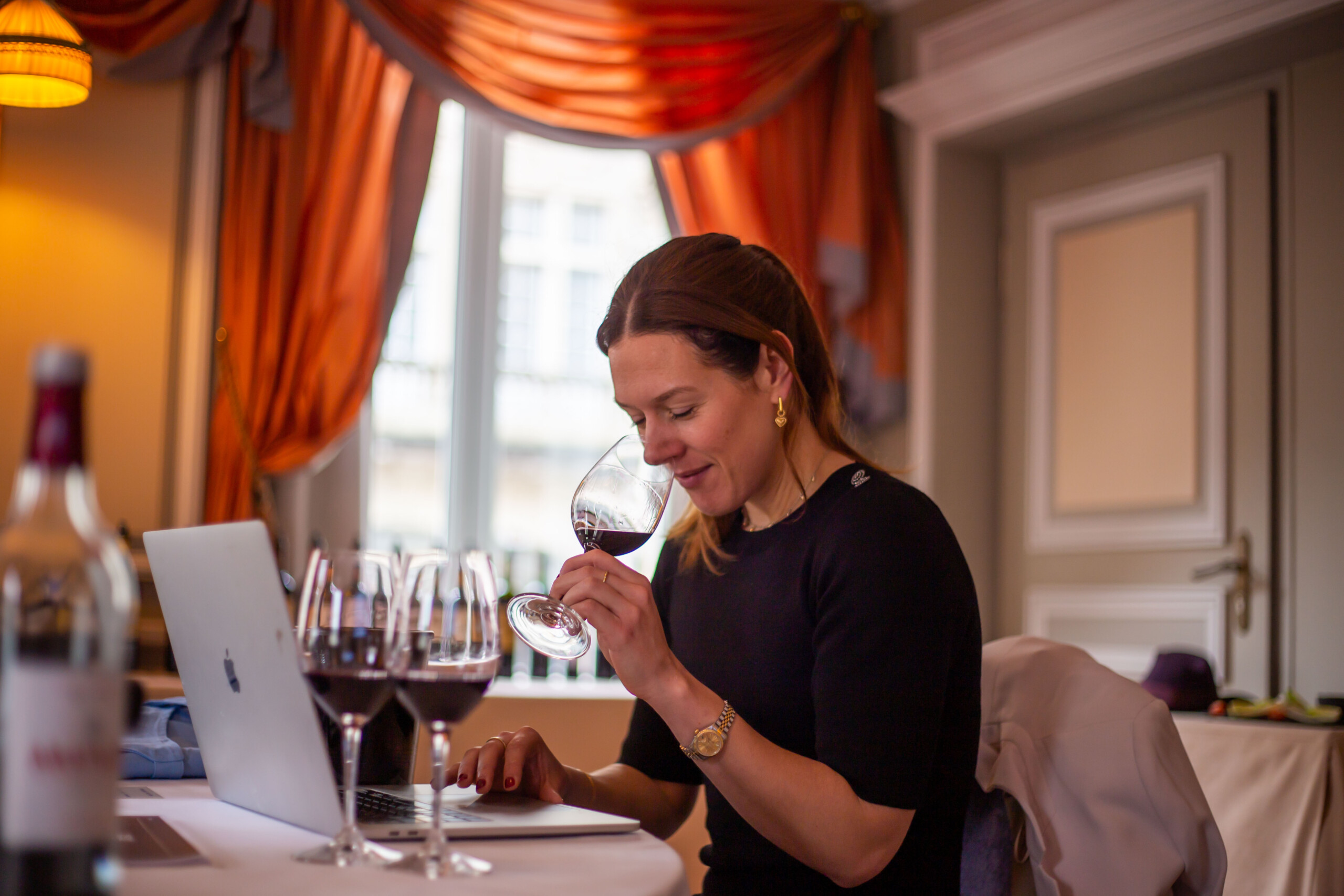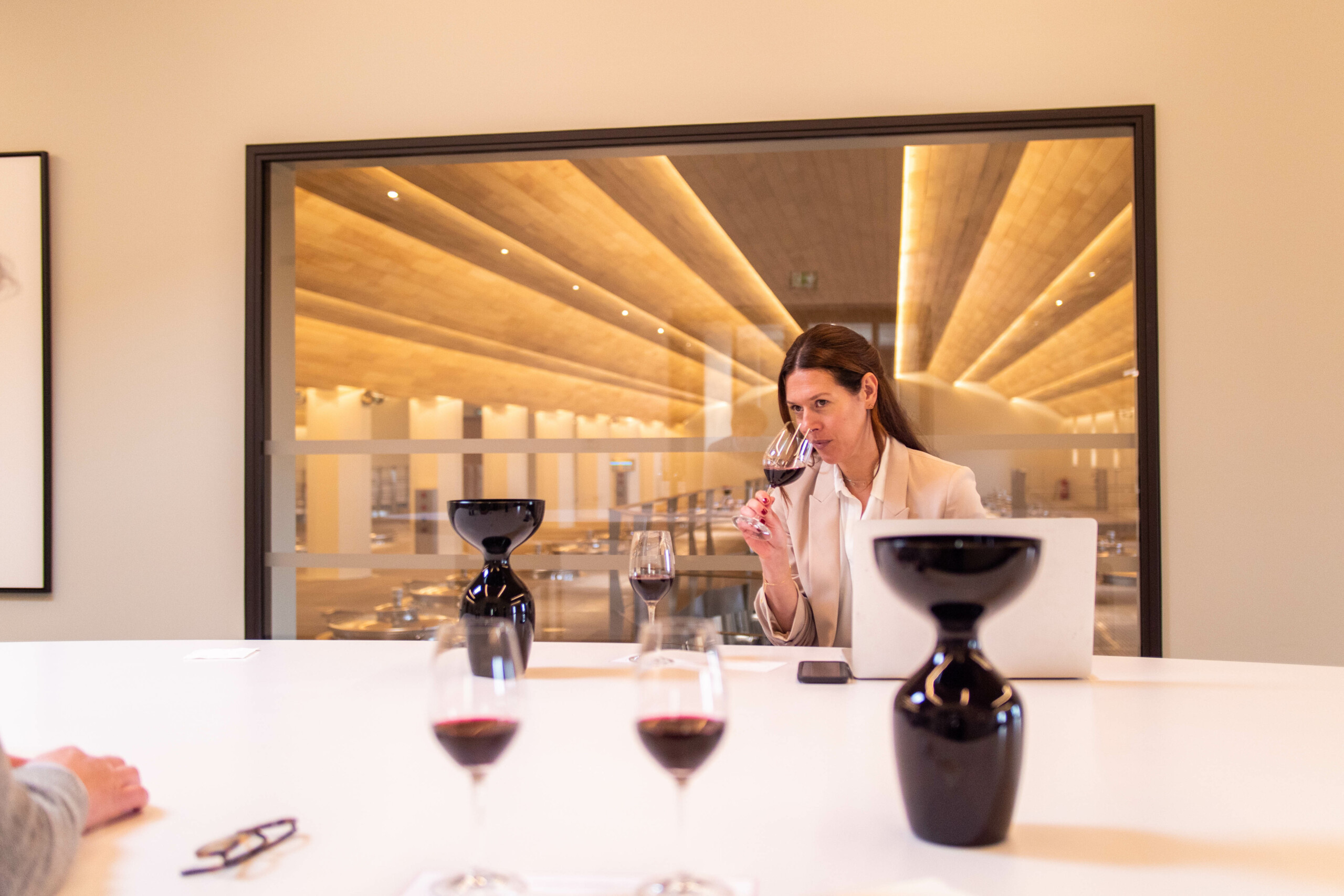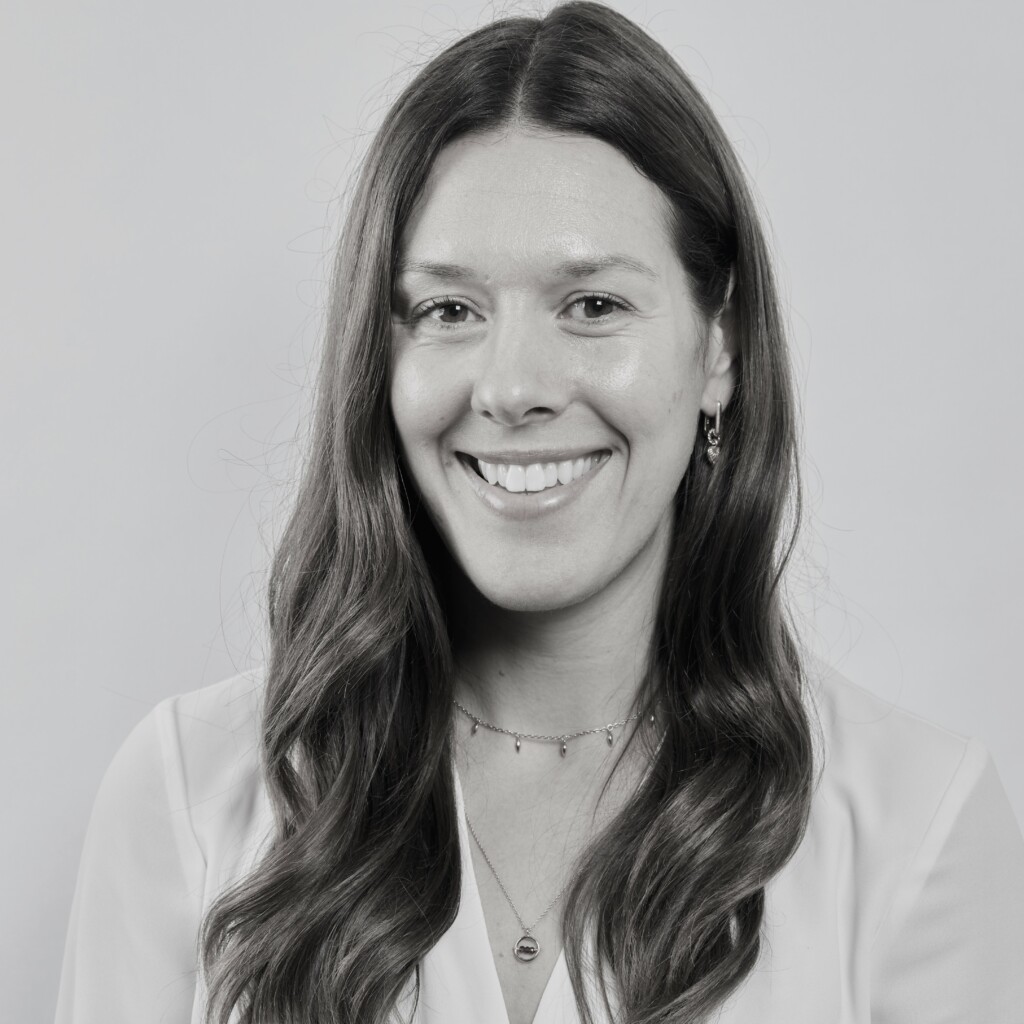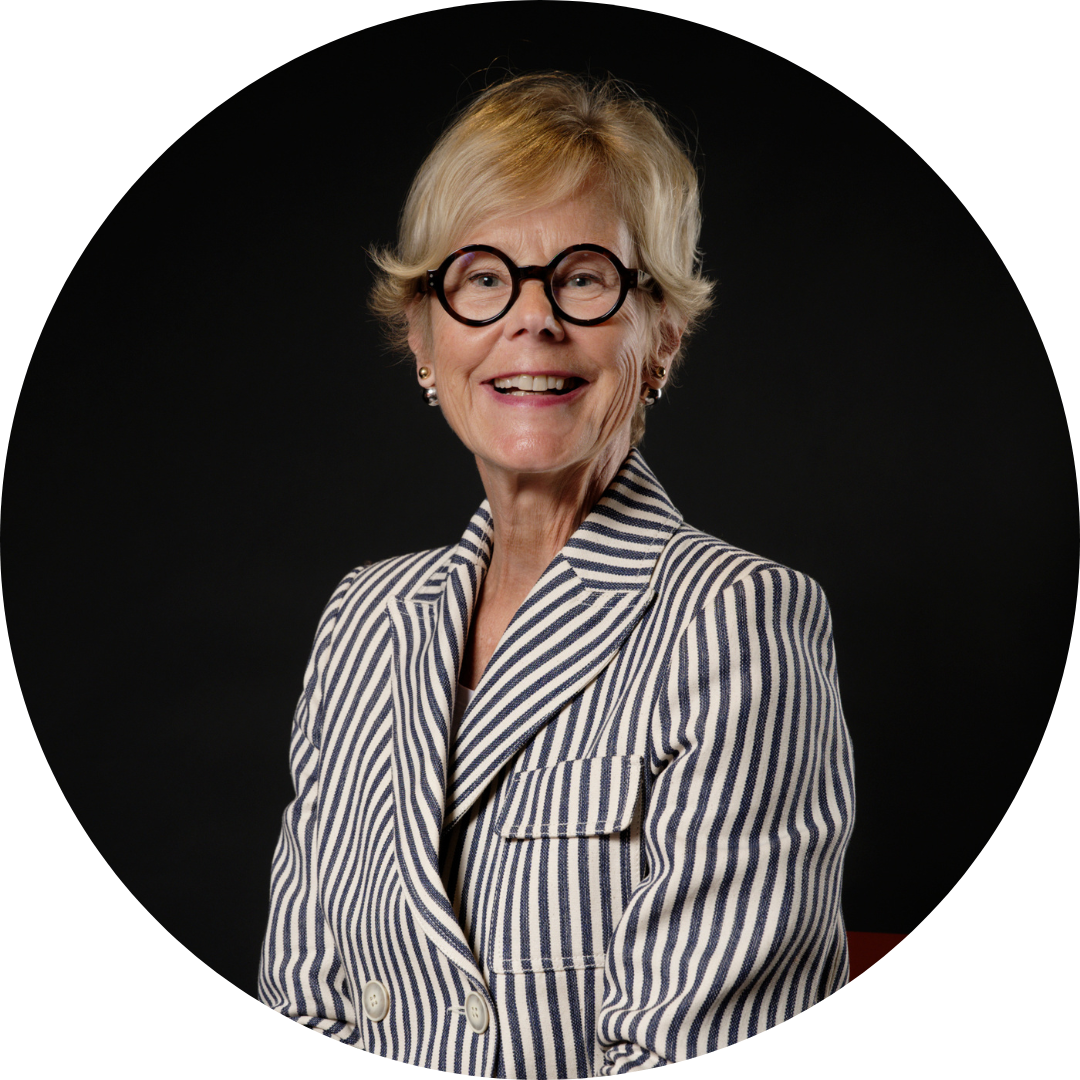Georgie Hindle
I often meet the dynamic Decanter Journalist Georgie Hindle in Bordeaux during tastings. So this interview was an excellent opportunity to get to know her better by asking her some questions over a cup of tea this time.
Gerda: Can you tell us about your background?
Georgie Hindle: I am the eldest child in a family of five children. I have always enjoyed being a part of a large family. You get the best of it. It is highly inspiring to have younger brothers and sisters. Perhaps it’s thanks to this upbringing that I am a creative, instinctive person, always on the outlook for new projects. I am outgoing, love meeting new people, enjoy good food and of course, have a passion for discovering wines. However, like many things in life, it’s all about balance – especially in the wine industry so I walk a lot and try to go to the gym as often as I can.
G: Why did you decide to become a journalist?
GH : My father was the one who suggested I pursue a career in journalism as he knew I was a good writer. Initially, I was planning on doing Philosophy, Politics and Economics (PPE) at University but it’s a notoriously difficult course to get onto and I didn’t get into my first choice University so decided to take a gap year to travel the world and try journalism a year later instead. I chose multimedia journalism Bournemouth University which was a fully a accredited course and started learning the ropes from the ground. Why wine? It is more or less a coincidence.
During my last year of university, there was an open day at a publishing company in London. I went along with most of my year and among other tasks we had to do a group project and present it to the management. I volunteered to present my group’s idea and I think that got me noticed. I was then asked back for a formal interview and subsequently received an offer to join their graduated scheme, along with one other person. After two years, as they like to place you in a job after training you, there was a vacancy at Decanter as deputy editor of their website. Initially, I wasn’t interested as I didn’t know about wine back then, but I needed a job and it seemed like a fun place to work. A few job changes later and I was living between London and France when a job as France editor came up, a year later I became Premium editor in charge of online subscriptions and content for the parts of Decanter.com behind the paywall. In 2021, I was already living in Bordeaux when I became Bordeaux correspondent following Jane Anson’s departure to start her own business. It is truly a captivating and glamorous dream world I find myself in, meeting extraordinary winemakers and experiencing incredible tastings. I feel really lucky to be part of it.
G: Where did this passion for Bordeaux come from?
GH : Bordeaux holds a special place in my heart. It was one of the first places Decanter sent me to, back in 2013, to cover the En Primeur 2012 campaign. This experience introduced me to a fascinating world filled with wonderful encounters with winemakers, sommeliers and members of the trade. Another memory from my early days was an amazing lunch with the former Château Mouton Rothschild winemaker Philippe Dhalluin at Cafe Lavinal tasting a vertical of the grand vin. My family also live in the nearby Lot-et-Garonne region so I visited Bordeaux a number of times for my holidays. I never dreamt that one day I would live in the city and my job would be tasting Bordeaux wines. It’s more demanding than I thought it would be but I absolutely adore it.

The business
G: How do you describe the role of a wine correspondent?
GH : I often ask myself this question: what is the real purpose of my job? As a wine correspondent at Decanter, we primarily write for the end consumer, although our articles are read also by the trade. What holds great significance for me is the question “what kind of message I would like to bring over”. I take great pleasure in highlighting lesser-known producers, not just the Classified Growths, but also wines from Sauternes or wines from the Satellite appellations. Bordeaux has never been so good in this range.
It takes time to truly understand the estates, their philosophies, and their unique characteristics. I dedicate a considerable amount of effort to bridge the gaps in my knowledge. Bordeaux is witnessing remarkable developments in this highly competitive world, especially during a time when there is a trend towards reduced alcohol consumption. I hold a deep admiration for those hard-working individuals who work tirelessly in the face of challenges like climate change, rising production costs, difficulties in hiring employees, and the ever-present stress of selling their wines.
G: Are you capable of giving an objective score to the wine?
GH : Oh, yes absolutely. It is a skill that can be developed through training, and at Decanter we are very keen on staying independent. The key is to understand the winemaker’s intended style and vision for the wine. I always try to explain why I like the wine or like it less, ensuring transparency in my evaluations. It’s easy to write positive notes on wines I like, but it’s more difficult being overly critical when I wouldn’t personally like to drink the wines. I try to keep in mind that somebody might like them even if I don’t.
G: How critical should wine criticism be, and how are you different from other wine critics?
GH : Good question, I think that being super critical may not be conducive to constructive discourse and helpful good advice. We (at Decanter) don’t ‘recommend’ any wine we don’t like; wines that have a lack of fruit, aren’t balanced or have too much acidity for instance. I am not the person to tell a winery how to make a wine. It is to share my personal assessment with our audience.
Indeed, we all have unique sensibilities and preferences when it comes to wine. I believe that wines need to have fruit and structure and represent the place and the people they are coming from. That’s why visiting wineries and talking with the people involved in the wine-making process are important. Wineries have undergone significant transformations over the last decade in terms of investments, sustainability practices, open-minded consultants and their ability to adapt to climate changes. There’s a new generation of winemakers with fresh perspectives, and I’m proud to be a part of this evolving landscape.
G: Do you think that criticism pushes winemakers to reflect and evolve?
GH : Undoubtedly critics have influences on the wine industry. The best example is the impact of Robert Parker in the past. One man has put his legacy on the style of wines: the Parkerisation. Scores remain highly influential and winemakers are often tempted to please certain palates depending on their target markets. High scores can undoubtedly boost wine sales. However, nowadays we see a score inflation that is going too far where even a 96+ score isn’t enough anymore.
G: Each vintage and terroir is unique. Can the winemaker be influenced by consumer taste, or vice versa?
GH : At the end of the day, you can’t make a Burgundy in Bordeaux. The winemaker can be influenced by the consumer taste as well. The best wines are those wines you want to drink. Nobody wants to produce wines of which half bottles are left un-drunk. Nowadays consumers prefer less overripe and over-extracted wines. Wine makers are producing fresher wines and even in the hot and dry 2022 vintage there is enough freshness to satisfy. A trend is to produce wines with lesser oak, allowing the flavours of Bordeaux grapes varieties to express themselves more fully.
Consumers rely on the advice of sommeliers, merchants, supermarket shelves, critics and influencers on Instagram. I have a love-hate relationship with sharing on social media so I’m not seeking that influence role. I worry sometimes about coming across as too showy, but we can’t ignore social media. We are all interconnected and have the potential to influence each other in various ways – many of them positive. If instagram helps more people get interested in wine then that’s great. It’s certainly a powerful tool.
G: How do you describe your personal taste?
GH : I would describe my taste as classic. I appreciate wines that are drinkable, well-balanced and possess vibrant freshness. I tend to prefer wines with an alcohol content under 13,5%. I love Champagne, Bordeaux obviously, and wines from Italy, especially Tuscany and Piedmont, but I also love wines from South Africa and have been fortunate to visit Chile and Germany in the past year, both make exceptional wines. My taste is also influenced by my love of travelling, but generally speaking, I drink very widely from Greek Assyrtiko to Napa Cabs. I also taste the March and September releases on the Place de Bordeaux which allows me to try some incredible wines from around the world that I wouldn’t otherwise get the opportunity to taste including those from Australia and New Zealand.

Climatic changes
Gerda: What do you think of organic and biodynamic wines?
GH : Consumers are becoming increasingly concerned about what they put in their bodies. Organic food has been around for a long time so it’s normal that people may want to extend that into their wine drinking habits too. People want to be more informed about what they are drinking and there is growing preference for organic and biodynamic wines, especially within a certain price range. Bordeaux has made a lot of positive efforts in conscious winemaking and sustainability over the past 10 years. However, it is important to note that organic or biodynamic farming in Bordeaux can be challenging due to the Atlantic climate. It’s certainly not the easiest place for this type of viticulture. This wet weather can present obstacles and there is a huge chance that you might have to sacrifice a portion of the crop once in a while which many winemakers couldn’t afford to do.
In addition to organic and biodynamic practices, efforts are being made in sustainable packaging such as reducing bottle weight, using eco-friendly capsules, and using recyclable carton boxes etc.
G: How do you manage to taste more than 50 wines a day, especially during the Primeur period?
GH :During the En Primeur campaign I taste even more than 50 wines a day and tasted many of the 2022s twice. In four weeks, I tasted over 900 wines which is almost too many wines for that period, especially when not all of them will be sold en Primeurs. It is important to get a broad overview of the quality of the vintage however. That’s why I like to taste the wine selections of negociants and consultants as well. They provide a certain perspective and approach to the quality of the vintage. En Primeur content remains important for Decanter and there is pressure to provide a thorough early indication of the new vintage’s quality. Next year I may decide to taste less en primeur and more ready-to-drink wines instead.
G: Can you speak about an unforgettable tasting?
GH : I am a lucky person because these ‘unforgettable tastings’ seem to happen all the time…. If I have to mention one, I would say the tasting of 45 Bordeaux 1982 wines earlier this year. I was invited to Vancouver in Canada to a tasting organised by avid wine lover and collector James Killam to raise funds for Dr. Yuzhuo Wang and cancer research following the sad passing of James’ wife to cancer. All of the first growths were present as were Petrus, Cheval Blanc, Figeac and Ausone. It was incredible and I will never forget this exceptional moment.
G: What do you think about the system La Place de Bordeaux?
GH : La Place de Bordeaux is a fascinating and complex system with many rules, players and nuances. It’s quite unique in the wine world. It has two different aspects. Firstly, it serves as an amazing promotional tool for Bordeaux where all eyes are on the merchants during key times of the year, notably during the annual en primeur campaign. Having so many businesses that sell your wine at the same time is quite impressive. Secondly, it functions as a fabulous selling tool for high-end wines. For these wines, La Place does an excellent job with negociants selling to more than 100 countries. This, on paper, provides a significant advantage for Bordeaux. It acts as an open network where anyone can access many wines at any point. People talk about its ‘capillarity’ but if someone in Singapore for instance wants a certain Bordeaux wine, Lafite 1982 let’s say, whether the negociant they ask has it or not, it will no doubt be found somewhere, bought and sold and reach the end customer. Its reach is truly amazing, and it wields significant influence. It is one of the reasons why so many wines from abroad aim to be a part of it.
However, the system doesn’t work well for wines that aren’t sought after – this could be because of poor scores, poor price to value ratio, lack of brand recognition or turbulent market times. Bordeaux as a region seems to be struggling at the moment. Wines have to be good value for money, even expensive ones, so price is often discussed. But there is a lot of potential still for the region, even in producing different styles – cremants and roses are popular so they may provide other revenue streams for struggling wineries. Bordeaux is improving oenotourism efforts too so that will help. It’s a great wine region to live in and I can see all the exciting and progressive happenings but the message still needs conveying to people who may think Bordeaux is not cool. More effort should be made to get Bordeaux wines into restaurants too.
Gerda BEZIADE has an incredible passion for wine, and possesses a perfect knowledge of Bordeaux acquired within prestigious wine merchants for 25 years. Gerda joins Roland Coiffe & Associés in order to bring you, through “Inside La PLACE” more information about the estate we sell.


